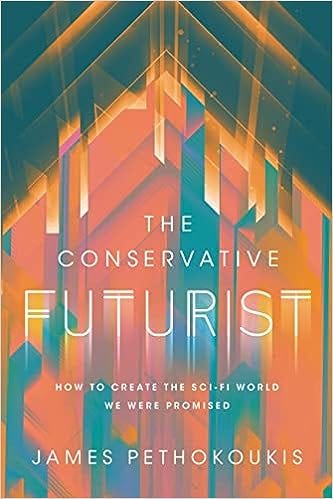💡 5 Quick Questions for … policy analyst Alex Trembath on the notion of 'Earth overshoot'
'It is not sound. Bottomless nonsense is, I think, the most generous way to put it.'
Quote of the Issue
"The future has always been the great treasure-house of meaning. People everywhere, dissatisfied with naked experience, have clothed the present with signs of things to come." - Daniel Boorstin, The Seekers
Some self promotion: I have a book coming out on October 3. The Conservative Futurist: How To Create the Sci-Fi World We Were Promised is currently available for pre-order pretty much everywhere. Some folks are already saying nice things about it:
Anyway, I’m very excited about it! Let’s gooooo! 🆙↗⤴📈
5QQ
💡 5 Quick Questions for … policy analyst Alex Trembath on the notion of “Earth overshoot”
When it comes to clear-eyed thinking about the climate, the folks at the Breakthrough Institute offer some of the best analysis around. (Their “Ecomodernist Manifesto” is a must-read!) Most recently, I Q&A chatted with Breakthrough’s Nuclear Energy Innovation Director Adam Stein. And last year, Alex Trembath, Deputy Director at the Breakthrough Institute, was generous enough to contribute his thoughts to a wide-ranging two-part 5QQ interview. Now, Alex is back to share his thoughts on Earth Overshoot Day — for those unaware, we humans supposedly used up a year’s worth of resources by August 2 of this year, meaning we’re in a biocapacity deficit for the remainder of the year — and the Ecological Footprint. Alex recently wrote a great piece, “Correction, Coercion, or Collapse” on those themes, but I knew my readers would be hungry for more. Check out our Q&A below:
1/ Can you briefly explain the notion of the ecological footprint and what that has to do with this anti-holiday, Earth Overshoot Day?
Anti-holiday is the best word for it. The ecological footprint is the sort of methodological framework behind this thing that you might've heard, which is that humans use about 1.7 Earth's worth of resources every year. It used to be 1.6, now it's about 1.7 according to them. And that means that by a certain day every year that the Global Footprint Network calculates, we are in “overshoot,” we have already used a year's worth of resources. This year, that was August 2nd, and for the rest of the year we're in deficit, we're in overshoot. That's based off this calculation called the ecological footprint that was created in the ‘90s by these two ecologists, William Rees and Mathis Wackernagel, who tried to create a unitary measure of humanity's footprint on Earth.
2/ What do you make of this methodology? Is it sound?
It is not sound. Bottomless nonsense is, I think, the most generous way to put it. What the ecological footprint does is it takes a number of measures of human impact on the Earth — fossil fuel consumption, farming, grazing, lumber and forestry, our impact on the seas and oceans — and tries to synthesize those into one measure: your ecological footprint. It does that by measuring the surplus or deficit on all of those metrics. But on almost all of those metrics, we are actually in balance because of the reductive nature of the metric itself. For crop land, for instance, we consume roughly — including the waste — as many crops as we produce. So we're in balance. I'm not really sure what that's supposed to tell us about our ecological sustainability. We could literally cover the Earth's land area in farmland and wipe out all of what's left of wild nature and be in balance according to this metric. The only reason that we're in deficit according to the ecological footprint is because of our fossil fuel consumption, which even there, the measurement isn't tons of carbon emissions in the atmosphere or tenths of a degrees centigrade warming or the typical metrics of our climate footprint. It is how many trees you would have to plant to offset the emissions of anthropogenic fossil fuel consumption. And again, there are a whole bunch of assumptions that go into that that don't make a lot of sense either. So we both have this metric that doesn't really tell you anything about the sustainability of human activity, of human consumption, of human society, and in fact does a worst job at measuring our very real ecological impact on the climate, on landscapes, on ecosystems, on biodiversity. Then just typical bread and butter garden variety metrics would like how many acres of forest are we cutting down every year? How many tons of CO2 are we pumping into the atmosphere? These are actual problems. They're actually measurable. And the ecological footprint is actually a way of oddly sort of undervaluing or under telling the story through its attempt to synthesize all of these measures into one.
It seems like every generation, the institutional environmentalist — not just the activist movement but the scholarly movement — has to invent some new baroque, complicated, faux-scientific methodology to pretend that there is such a thing as a fixed ecological boundary on human activity.
Keep reading with a 7-day free trial
Subscribe to Faster, Please! to keep reading this post and get 7 days of free access to the full post archives.






